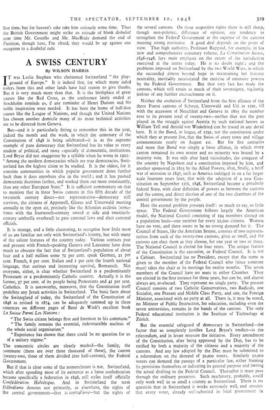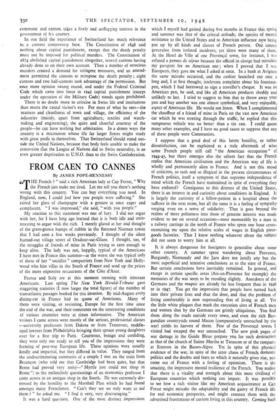A SWISS CENTURY
By WILSON HARRIS TT was Leslie Stephen who christened Switzerland " the play- ground ground of Europe." It is indeed that, for which many jaded toilers from this and other lands have had reason to give thanks. But it is very much more than that. It is the birthplace of great causes like the Red Cross, as the conference lately ended at Stockholm reminds us, if any reminder of Henri Dunant and his noble inspiration were needed. It has been the home of half-lost causes like the League of Nations, and though the United Nations has chosen another domicile many of its more technical activities are to be directed from Geneva.
But—and it is particularly fitting to remember this in the year, indeed the month and the week, in which the centenary of the Constitution of 1848 is being celebrated—it is as the supreme example of pure democracy that Switzerland has its value to every student of political, and more especially of democratic, institutions. Lord Bryce did not exaggerate by a syllable when he wrote in 192o: "Among the modern democracies which are true democracies, Swit- zerland has the highest claim to be studied. It is the oldest, for it contains communities in which popular government dates further back than it does anywhere else in the world ; and it has pushed democratic doctrines farther, and worked them out more consistently, than any other European State." It is sufficient commentary on that to mention that in three Swiss cantons in this fifth decade of the twentieth century direct—not representative—democracy still survives, the citizens of Appenzell, Glarus and Unterwald meeting annually in the open air, precisely like the Athenian ecclesia (some- times with the fourteenth-century sword at side and twentieth- century umbrella overhead) to pass cantonal laws and elect cantonal officials.
It is strange, and a little chastening, to recognise how little most of us are familiar not only with Switzerland's history, but with many of the salient features of the country today. Various contacts past and present with French-speaking Geneva and Lausanne have done much to obscure the fact that of Switzerland's population of about four and a half million some 72 per cent. speak German, 21 per cent. French, 6 per cent. Italian and r per cent the fourth national language, that curious and interesting survival, Romansch. Not everyone, either, is clear whether Switzerland is a predominantly Protestant or a predominantly Catholic country. Actually it is the former, 57 per cent. of its people being Protestants and 41 per cent. Catholics. It is noteworthy, moreover, that the Constitution itself prohibits any Jesuit activities in Switzerland. The basic facts about the Switzerland of today, the Switzerland of the Constitution of 1848 as revised in 1874, can be adequately summed up in three sentences on different pages of Rene de Week's excellent book La Suisse Parmi Les Nations :
"The Swiss citizen belongs first and foremost to his commune." " The family remains the essential, indestructible nucleus of the whole social organisation."
" Experience has shown that there could be.no question for us of a unitary regime."
The concentric circles are clearly marked—the family, the commune (there are over three thousand of these), the canton (twenty-two, three of them divided into half-cantons), the Federal Government.
But if that is clear some of the nomenclature is not. Switzerland, which after spending most of its existence as a loose confederation became specifically a federation in 1848, still styles itself officially Confederation Helvitique. And in Switzerland the term feden2lisme denotes not primarily, as elsewhere, the rights of the central government—that is centralisme—but the rights of the several cantons. On those respective rights there is still sharp, though non-polemic, difference of opinion, any tendency to strengthen the Federal Government at the expense of the cantons meeting strong resistance. A good deal depends on the point of view. That high authority, Professor Rappard, for example, in his new and comprehensive centenary volume, La Constitution Suisse, 1848-1948, lays main emphasis on the extent of the jurisdiction exercised at the centre today. He is no doubt right ; and the problems imposed on Switzerland by the two World Wars, in which she succeeded almost beyond hope in maintaining her historic neutrality, inevitably necessitated the exercise of extensive powers by the Federal Government. But that very fact has made the cantons, which still retain so much of their sovereignty, vigilantly jealous of any further encroachment on it.
Neither the evolution of Switzerland from the first alliance of the three Forest cantons of Schwyz, Unterwald and Uri in 1291, till with the accession of Neuchatel and Geneva in 1815 the number rose to its present total of twenty-two—neither that nor the part played in the struggle against Austria by such national -heroes as William Tell and Arnold von Winkelried can be traced in any detail here. It is the Bund, or league, of 1291, not the constitution under which they at present live, that the Swiss of every town and village commemorate yearly on August xst. But for five centuries and more that Bund was simply a loose alliance, in which every canton remained its own master and no minority was bound by a majority vote. It was only after hard vicissitudes, the conquest of the country by Napoleon and a constitution imposed by him, and another sponsored in 1815 by the Allied Powers, after, finally, a brief war of secession in 1847, such as America indulged in on a far larger scale fourteen years later, that with the adoption of a new Con- stitution on September 12th, 1848, Switzerland became a genuinely federal State, with clear definition of powers as between the cantons and the centre, and direct election of one of the two chambers of the central government by the people.
Here the eternal problem presents itself : so much to say, so little space. The Federal Government follows largely the American model, the National Council consisting of 194 members elected on a population basis—one member for every 22,000 citizens. Women have no vote, and there seems to be no strong demand for it. The Council of States, like the American Senate, consists of two represen- tatives from each of the twenty-two cantons, great or small, and the cantons can elect them as they choose, for one year or two or three. The National Council is elected for four years. The unique feature of the Constitution is the executive, or Federal Council. It is not a Cabinet. Switzerland has no President, except that the name is given to the member of the Federal Council who (since someone must) takes the chair at its meetings for twelve months. The seven members of the Council have no seats in either Chamber. They are elected in the first instance for three years, but can be, and almost always are, re-elected. They represent no single party, The present Council consists of two Catholic Conservatives, two Radicals, one Socialist, one Peasant and Middle Class Party, and one, the Foreign Minister, associated with no party at all. There is, it may be noted, no Minister of Public Instruction, for education, including even the seven universities, remains in the hands of the cantons. The only Federal educational institution is the Institute of Technology at Zurich.
But the essential safeguard of democracy in Switzerland—the factor that so completely justifies Lord Bryce's verdict—is the referendum, and in lesser measure the initiative. Every amendment of the Constitution, after being approved by the Diet, has to be ratified by both a majority of the citizens and a majority of the cantons. And any law adopted by the Diet must be submitted to a referendum on the demand of 30,000 voters. Similarly 50,000 voters can demand the passage of a particular law, either framing its provisions themselves or indicating its general purpose and leaving the actual drafting to the Federal Council. Thereafter it must pass through the ordinary processes. Such machinery, probably, could only work well in so small a country as Switzerland. There is no questiOn that in Switzerland it works extremely well, and ensures that every voter, already well-schooled in local government in .commune and canton, takes a lively and unflagging interest in the government of his country.
In one field the experience of Switzerland has much relevance to, a current controversy here. The Constitution of 1848 said nothing about capital punishment, except that the, death penalty must not be imposed for political murders. The Constitution of 1874 abolished capital punishment altogether, several cantons having already done so on their own account. Then a number of atrocious murders created a demand for stringent measures, and an amend- ment permitted the cantons to reimpose the death penalty ; eight cantons and two half-cantons took advantage of the permission. But once more opinion swung round, and under the Federal Criminal Code which came into force in 1942 capital punishment (except under the operation of the Military Code) stands again prohibited.
There is no doubt more to criticise in Swiss life and institutions than meets the casual visitor's eye. For most of what he sees—the neatness and cleanliness of town and village, the efficiency of the ndustries (mainly, apart from agriculture, textiles and watch- making and engineering), the quiet and cheerful courtesy of the , people—he can have nothing but admiration. In a dozen ways the country is a microcosm whose life far larger States might study with great profit to themselves. That Swirzerland"should stand out- side the United Nations, because that body feels unable to make the concession that the League of Nations did to Swiss neutrality, is an even greater deprivation to U.N.O. than to the Swiss Confederation.



































 Previous page
Previous page